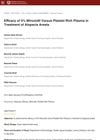1 citations,
November 2023 in “Life” Hyaluronic acid injections can improve mouth opening and quality of life in scleroderma patients.
 1 citations,
September 2023 in “Dermatology and Therapy”
1 citations,
September 2023 in “Dermatology and Therapy” Baricitinib helps improve hair growth in severe alopecia, with better results in less severe cases and higher doses working faster.
[object Object] 1 citations,
August 2023 in “Biomolecules” Certain immune-related proteins are higher in people with alopecia and their healthy relatives, hinting at a genetic link.
1 citations,
April 2023 in “Heliyon” Disitamab vedotin and gemcitabine effectively treated bladder cancer without major side effects.
 1 citations,
October 2022 in “Journal of food and nutrition research”
1 citations,
October 2022 in “Journal of food and nutrition research” Cinnamon may help manage obesity and improve conditions related to Polycystic Ovary Syndrome (PCOS).
1 citations,
January 2021 in “Skin appendage disorders” Alopecia areata in children is usually mild and effectively treated with strong topical steroids.
January 2025 in “Advances in experimental medicine and biology”  December 2024 in “Pakistan Armed Forces Medical Journal”
December 2024 in “Pakistan Armed Forces Medical Journal” PRP is more effective than Minoxidil for treating alopecia areata.
December 2024 in “IntechOpen eBooks” Drug repurposing speeds up development, cuts costs, and uses known safe drugs, but faces challenges like regulations and patents.
[object Object]  August 2024 in “Drug Design Development and Therapy”
August 2024 in “Drug Design Development and Therapy” Decursin shows promise for treating cancer, neuroprotection, inflammation, and hair loss.
April 2024 in “Tạp chí Y học Thảm hoạ và Bỏng” Choosing the right treatment for hair loss is complex and depends on effectiveness, side effects, practicality, and cost.
 April 2024 in “Pharmaceuticals”
April 2024 in “Pharmaceuticals” Bimatoprost helps with hair growth and eye conditions but can be costly and have side effects.
 April 2024 in “Pigment cell & melanoma research”
April 2024 in “Pigment cell & melanoma research” Different types of resting melanocyte stem cells have unique characteristics and vary in their potential to become other cells.
 March 2024 in “EMBO molecular medicine”
March 2024 in “EMBO molecular medicine” Antiviral drugs, especially daclatasvir, may be a new treatment for a rare skin disease, improving survival and reducing symptoms in mice.
 February 2024 in “Journal of Cosmetic Dermatology”
February 2024 in “Journal of Cosmetic Dermatology” White hair patch repigmented and hair regrew in a balding patient after treatment with exosomes and laser.
 February 2024 in “Scientific Reports”
February 2024 in “Scientific Reports” Cinnamic acid may help hair grow by activating oxytocin receptors.
 February 2024 in “International Journal of Molecular Sciences”
February 2024 in “International Journal of Molecular Sciences” Hair loss in Androgenetic Alopecia is caused by genetics, aging, and lifestyle, leading to hair follicle shrinkage and related health risks.
 January 2024 in “JEADV clinical practice”
January 2024 in “JEADV clinical practice” Patients were highly satisfied with shared medical appointments for hair loss treatment.
 January 2024 in “Journal of Ayurveda and integrative medicine”
January 2024 in “Journal of Ayurveda and integrative medicine” Millets may help reduce chemotherapy side effects like nausea, fatigue, and hair loss.
 December 2023 in “JAAD international”
December 2023 in “JAAD international” Teledermatology is highly effective for diagnosing and managing hair loss.
 November 2023 in “Translational Medicine Communications”
November 2023 in “Translational Medicine Communications” Derinat may improve hair growth and quality of life in hair loss patients by reducing oxidative stress.
 November 2023 in “Clinical, Cosmetic and Investigational Dermatology”
November 2023 in “Clinical, Cosmetic and Investigational Dermatology” Saw palmetto extract reduced hair loss and improved hair growth in people with hair thinning.
September 2023 in “International journal of molecular sciences” Targeting lipid metabolism can help treat advanced, resistant cancers.
 September 2023 in “British Journal of Dermatology”
September 2023 in “British Journal of Dermatology” Hair regrowth from severe alopecia areata treatment with baricitinib can vary, with faster results in those with shorter hair loss duration.
 June 2023 in “Current Issues in Molecular Biology”
June 2023 in “Current Issues in Molecular Biology” DN106212, an extract from a plant, is better at promoting hair growth than other tested substances by affecting hair growth factors and follicle development.
 May 2023 in “Journal of the Dermatology Nurses' Association”
May 2023 in “Journal of the Dermatology Nurses' Association” The DNA convention was a valuable opportunity for learning and networking, especially after COVID-19.
 March 2023 in “International journal of trichology”
March 2023 in “International journal of trichology” Six genetic conditions are often linked to complete scalp hair loss in children.
 January 2023 in “Applied sciences”
January 2023 in “Applied sciences” Gefitinib and Sasam-Kyeongokgo together significantly reduce cancer growth and improve immune response in mice.
 October 2022 in “Frontiers in Genetics”
October 2022 in “Frontiers in Genetics” The research found new potential mechanisms in mouse hair growth by studying RNA interactions.
 August 2022 in “IARS international research journal”
August 2022 in “IARS international research journal” The document concludes that drug repurposing, which is reusing known medicines for new illnesses, can provide faster, cheaper treatment options for various serious diseases, including cancer, COVID-19, and rare diseases.





















